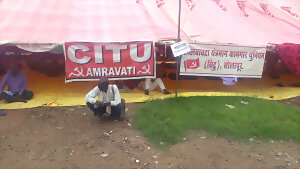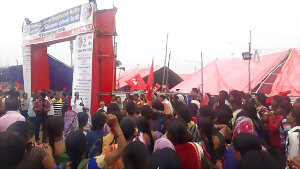
views
New Delhi: Almost ten thousand farmers, industrial workers, services sector employees and landless agricultural labourers from across the country have camped in New Delhi for a mega protest on Wednesday. Their major demands include better living and working conditions, more jobs, land for the landless and better prices for farm produce, among others.
The rally is being organised by the CITU, AIKS and AIAWU.

(A farmer rests in front of a make-shift camp at Asaf Ali Road.)
Arun Patnaik, a rice farmer, has come all the way from Nasik to express his dissatisfaction over dwindling returns for his farm produce. Having spent his first night on the New Delhi railway platform, he moved to the camps in Asaf Ali Road the next day. “One representative from every family has come. Party workers in my area said they will help me raise my demands and that is why I am here," said Patnaik.
Farmers mostly from the states of Madhya Pradesh, Maharashtra, Uttar Pradesh and Haryana will be participating in the protest at Delhi’s Parliament Street.
Local and national leaders of the three organisations have been criticising the very ‘anti-national’ character of the present government in a build-up to the mega-rally. “If the government refuses to listen to 99 percent of the population, and in fact, works against it, then it has no right to stay in power and must be defeated," said representatives of CITU.

(Sloganeering in the camps ahead of the protest.)
“This is for the first time that three major classes in the country are in a common struggle," said Baju, a farmer from Madhya Pradesh who is in the National Capital as part of the protest. He also expressed his dissatisfaction over the government’s latest Cabinet decision on MSP.
The Cabinet’s 4 July decision to increase minimum support price (MSP) for Kharif crops, intended to appease farmers, did not seem to have struck the right chord.
CCEA in its meeting had approved an increase in MSP for summer crops, especially paddy and dal, as a move to fulfil its Budget promise and address farmers' concerns about the cost of crops.
The increase, however, is based on A2+FL formula, which takes into account the actual cost plus the imputed value of family labour in the production of a crop.
Farmer associations across the country are unhappy with the cost calculations as they expected C2 costs to be taken into consideration. This formula factors in multiple costs, including imputed rent on land and interest on capital, which makes the cost of production much higher.
During the announcement of the Budget in February 2018, Arun Jaitley had said that the insurance of MSPs of Kharif crops at 1.5 times their costs will be based on the A2+FL costs, and not the more ambitious C2 costs formula favoured by farm scientist MS Swaminathan.
“The increase in MSP is not adequate. The formula A2+FL does not factor in everything that goes in, in producing crops. Swaminathan report also states that it is C2 that needs to used to calculate MSP," said Pushpendra Singh, a farm leader in Uttar Pradesh.
The move comes as a way to address farmers' distress as major nationwide protests with various demands have taken place this year.
According to aggregated data provided by farmer associations in Uttar Pradesh, Madhya Pradesh, Rajasthan, Punjab and Maharashtra, the current rise in MSP would have been approximately 40 percent higher had it been calculated on C2 costs.
The CCEA had approved a rise in MSP for paddy by approximately Rs 250 per quintal to Rs 1,800 per quintal. Earlier, the prices were at Rs 1,550 per quintal. The cost would have been Rs 2,250 had C2 costs been factored in.
The cost of the revised MSP is estimated to be around Rs 33,500 crore as of now.

Minimum support price is a form of market intervention by the government to insure farmers against any sudden fall in agricultural produce prices. The MSP is a guaranteed price for their produce from the State.
Farm associations are also concerned about state governments improving purchasing mechanisms. “Now the ball is in the court of concerned states. They need to work meticulously on improving the amount and mechanism involved in purchasing of crops," said Mohini Mohan, national secretary, Bhartiya Kisan Sangh.
There have been two massive nation-wide industrial strikes (in 2015 and 2016) followed by a mammoth sit-in (mahapadav) at Delhi in 2017, organised by a platform of ten trade unions.
There have been sectoral strikes by coal, transport, plantation, scheme-workers, etc. There have been a series of movements by farmers across 13 states, including the now famous Rajasthan struggle and the Kisan Long March in Maharashtra. Government employees, bank, insurance, defence, and many other public sector employees have struck work to demand better working conditions and end to privatisation.



















Comments
0 comment